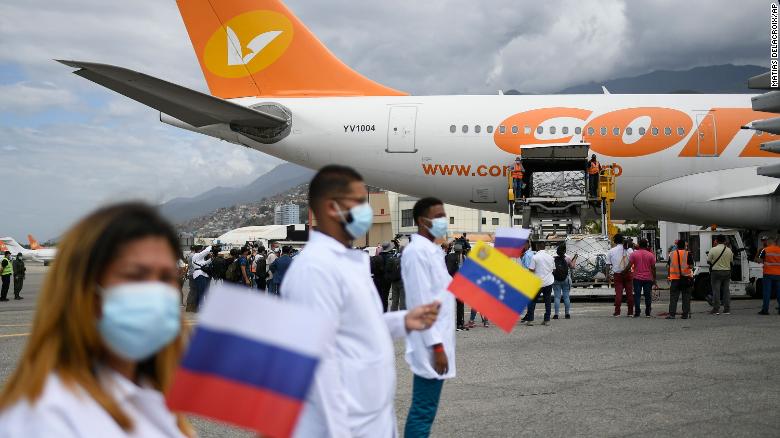Sputnik-V vaccine arrives in Venezuela 2:50
(CNN) -
Russia is emerging as a major supplier of COVID-19 vaccines for Latin America, a move that could have lasting consequences on shaping the post-pandemic world and further affect the standing of the United States in the region.
While Moscow faces protests at home and condemnation for human rights issues from the United States, France, the United Kingdom, Canada, and other Western countries, those issues have had little resonance in Latin America, where the recent release of a revised positive assessment The Russian Sputnik V vaccine in The Lancet, Britain's leading medical journal, was widely celebrated.
Eduardo Valdés, a former diplomat and member of the Frente de Todos government coalition, who now serves as chairman of the Foreign Relations Committee of the Argentine Chamber of Deputies, says there is a clear line between the vaccine negotiations and external factors.
Now is not the time to do ideology.
Our goal is for the Western Hemisphere to get its vaccines and not meddle in someone else's internal affairs, "he told CNN.
MIRA: Panama wants 3 million doses of the Sputnik V vaccine
They look to Moscow for help
Although historically seen as Washington's geopolitical "backyard," Latin America is increasingly turning to Moscow for help in dealing with the pandemic.
Six countries in the region (Argentina, Bolivia, Mexico, Nicaragua, Paraguay and Venezuela) have already authorized the use of the Sputnik V vaccine. Others are considering applications for authorization, which are increasingly urgent given the global shortage of available vaccines.
advertising
The case of Colombia is an example: Bogotá, the United States' closest regional ally, is now about to authorize Sputnik V as well, a decision that surprised many due to the close alignment between some sectors of the government coalition and the Republican Party of the United States.
In the past, right-wing members of President Iván Duque's own party, the Democratic Center, openly criticized Putin's involvement in Latin America.
MIRA: These are the Latin American countries that authorized Sputnik V
But when the country found itself out of vaccines in late January, Duque appears to have decided to put ideology aside.
The day after The Lancet's publication on Sputnik V, Colombia announced that it was starting negotiations with Russia.
Less than three months earlier, Bogotá had expelled two Russian officials in unclear circumstances.
But the expulsion "did not influence the negotiations to bring the vaccine here," Leonid Sboiko, first secretary of the Russian embassy in Bogotá, told CNN.
The Colombian Ministry of Health declined to comment on the status of the negotiations.
MIRA: Colombia and Venezuela expel diplomatic officials from the other country
If anything, the vaccine deal could be a step to smooth things over.
«Both countries want to turn the page.
It was unfortunate, but we want to move on, "said Sboiko, adding:" Cooperating on vaccines is the most pressing issue at the moment and it will positively influence bilateral relations. "
Sboiko told CNN that the Russian Direct Investment Fund (RDIF), which handles the commercialization of Sputnik V, submitted an emergency authorization request to the Colombian medical agency INVIMA last week, and is ready to deliver 100,000 doses within the 14 days after purchase.
“I think they had to swallow their pride and buy the vaccine no matter who they bought it from.
And the Russians acted with enormous pragmatism, "Juan Carlos Ruiz, professor of Foreign Relations at the Universidad del Rosario in Bogotá, told CNN.
Colombia will begin vaccinations this week, after receiving 50,000 doses as the first shipment from Pfizer.
The ease of doing business
The need for more vaccines is urgently felt in the region.
Latin American countries are among the most affected in the world by the pandemic, but large-scale vaccination campaigns have not yet begun, with limited exceptions.
According to the University of Oxford, South American countries have on average dispensed less than two doses of any coronavirus vaccine per 100 people, compared with almost five doses per 100 people in the EU and more than 14 doses per every 100 people in the US
Russia's willingness to close deals has been key to spreading the vaccine in Latin America so far, according to Danil Bochkov, an international relations expert at the Russian Council on International Affairs.
“It is always easier to deal with the state than with a private company, which has to cover possible risks for fear of great losses.
It is easier to negotiate with state-owned companies, especially when they pursue political goals, ”Bochkov told CNN.
Valdés, the Argentine lawmaker, says the negotiations with Moscow were easier than with Pfizer, from whom the Argentine government initially planned to buy vaccines.
"When we looked at the contract, we evaluated that those who had Pfizer did not comply with the legal protocols that we expected," said Valdés.
"We communicated with the Russians and the president [of Argentina] Alberto Fernández directly related directly to Putin, and this accelerated things," he told CNN.
Argentina has so far purchased up to 25 million doses of the Sputnik vaccine and has dispensed more than 600,000 doses.
Meanwhile, it is still waiting to dispense the first Pfizer vaccine.
In a statement to CNN, Pfizer said the company remains committed to working with the Argentine government, but declined to comment on the status of the confidential negotiations.
Regional neighbors Peru and Brazil have also cited problems in negotiations with Pfizer, allegedly due to some of the liability clauses it requested, eventually turning to other vaccines: Chinese-made Sinopharm in Peru and Coronavac and AstraZeneca in Brazil.
sputnik VVaccine

